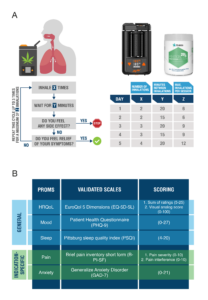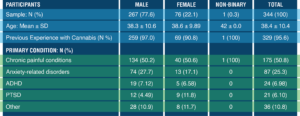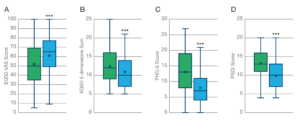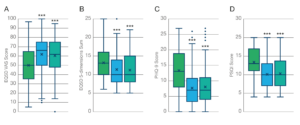The inhalation of THC-predominant cannabis flower improves quality of life and symptoms of chronic pain and anxiety in UK patients, finds a new study.
In a new paper, published using data from the UK observational study Project Twenty21 (T21) patients report ‘significant improvements’ in health-related quality of life when prescribed a THC-predominant cannabis flower produced by Khiron Life Sciences.
Inhalation of Khiron 20:1, which contains 20% THC to 1% CBD, was also shown to improve general mood and sleep, as well as pain severity and symptoms of anxiety.
Khiron 20:1 is thought to be one of the most commonly-prescribed products in the T21 formulary.
An overview of the study
In November 2018, the UK’s Home Office established a legal route for eligible patients to be prescribed cannabis based products for medicinal use in humans (CBPMs) as unlicensed medicines. These include liquid cannabis extracts for oral administration (‘oils’) and dried flowers for inhalation (‘flos’). Smoking of CBPMs is expressly prohibited.
To date, THC-predominant cannabis flowers remain the most prescribed CBPMs in Project Twenty21 (T21), the first multi-centre, prospective, observational UK cannabis patient registry.
This observational, prospective data review analyses patient-reported outcome measures (PROMS) collected by T21 associated with the inhalation of the product, Khiron 20:1, the most prescribed CBPM in the project (FIGURE 1A).
PROMS collected at baseline and at subsequent three-month follow-up included health-related quality of life (HRQoL), general mood, and sleep. Condition-specific measures of illness severity were performed with the Brief Pain Inventory Short Form (BPI-SF) and the Generalised Anxiety Disorder 7-Item Scale (GAD-7) (FIGURE 1B).

FIGURE 1. (A) Proposed protocol to initiate naïve patients and prescribing doctors safely into the inhalation of THC-pre-dominant cannabis flos Khiron 20:1. (B) Patient-reported outcome measures (PROMS) collected by Project T21.
The findings
Participants were mostly males (77.6%, average age = 38.3) diagnosed mainly with chronic pain (50.9%) and anxiety-related disorders (25.3%) (TABLE 1).

TABLE 1. Cohort demographics, previous cannabis use and primary diagnosed conditions.
Inhalation of Khiron 20:1 was associated with a marked increase in self-reported HRQoL, general mood, and sleep. (FIGURE 2). Condition-specific assessments showed significant improvements in pain severity and interference in patients using Khiron 20:1 for chronic pain.

FIGURE 2. Improvement of general health outcome measures at the 3-month follow-up. inhalation of KHIRON 20:1 was associated with a marked improvement in self-reported health related QoL (N=344) measured as (A) the scoring of the VAS of the EQ5D, and (B) the sum of the 5 dimensions of the EQ5D questionnaire. (C) General mood/ clinical depression assessed with the PHQ-9 scale (N=339) was markedly improved. This effect was mainly driven by patients diagnosed with anxiety-related disorders. (D) Quality of sleep assessed with the Pitts- burgh Sleep Quality Index (N=344) was improved by the treatment with inhaled chemotype 1 cannabis flos.
Similar results were found for patients diagnosed with anxiety-related disorder (FIGURE 3).

FIGURE 3. Comparative improvement of general health outcome measures at 3- and 6-month follow-up. Analysis of outcome measures reported by patients that completed the validated questionnaires both at 3- and at 6-months follow-up visits (N=140). Improvements associated with the inhalation of Khrion 20:1 in (A, B) HRQoL, (C) General mood/ clinical depression, and (D) quality of sleep were maximal at 3 months and maintained, although not further increased, at the 6-month follow-up.
Reported effects were maintained after 6 months (FIGURE 4).

FIGURE 4. Improvement of indication-specific outcome measures at the 3-month follow-up. Analysis of PROMS shows how the inhalation of Khiron 20:1 was associated with a marked improvement in self-reported (A) pain severity and (B) pain interference in patients diagnosed with chronic painful conditions, measured with the Brief Pain Inventory-short form (N=174). (C) Generalised anxiety measured with the GAD-7 questionnaire was markedly decrease after 3 months of treatment with cannabis flos Khiron 20:1 (N=107).
Conclusion
The authors concluded: “Our results indicate that controlled inhalation of pharmaceutical grade, THC-predominant cannabis flos, Khiron 20:1 is associated with a significant improvement in patient-reported pain scores, mood, anxiety, sleep disturbances and overall HRQoL in a treatment-resistant clinical population.”
Read the full paper here

- Finding the right balance: the benefits of mixing THC and CBD flower
- Nine out of 10 chronic pain patients see improvements with cannabis
- Khiron’s medical cannabis training gains UK CPD approval
- Joe Exotic, the ‘Tiger King’, reportedly set to launch cannabis brand from prison
- Celebrities including Drake call for a general pardon for those involved in cannabis offences
The post High-THC cannabis flower linked to improvements in quality of life appeared first on Cannabis Health News.

